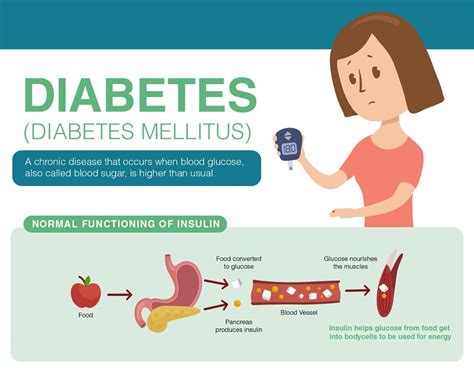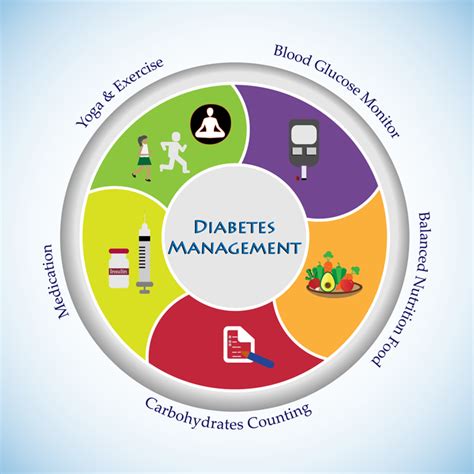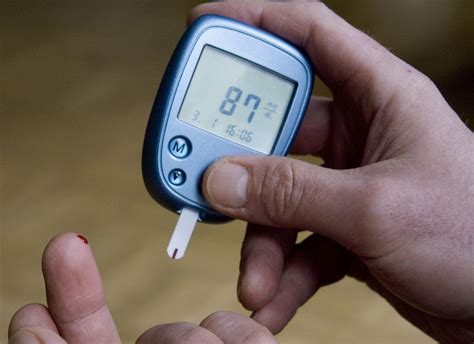Intro
Discover 5 effective ways to manage diabetes, including diet control, exercise routines, and stress management, to regulate blood sugar levels and prevent complications, promoting a healthy lifestyle with diabetes management tips and strategies.
Living with diabetes can be challenging, but with the right approach, it is possible to manage the condition effectively and lead a healthy, active life. Diabetes is a chronic health condition that affects how your body turns food into energy, and it is essential to take control of your health to prevent complications. There are several ways to manage diabetes, and in this article, we will explore the most effective methods to help you take charge of your health.
Diabetes management is crucial to prevent long-term damage to your body. If left unmanaged, diabetes can lead to serious health problems, such as heart disease, kidney damage, and nerve damage. However, with the right treatment plan, healthy lifestyle choices, and regular monitoring, you can manage your diabetes and reduce the risk of complications. It is essential to work closely with your healthcare team to develop a personalized plan that suits your needs and lifestyle.
Effective diabetes management requires a comprehensive approach that includes a healthy diet, regular physical activity, stress management, and regular monitoring of blood sugar levels. A healthy diet is essential to manage diabetes, as it helps to regulate blood sugar levels and maintain a healthy weight. Eating a balanced diet that is rich in fruits, vegetables, whole grains, and lean protein can help to manage diabetes. Regular physical activity is also crucial, as it helps to improve insulin sensitivity, reduce blood sugar levels, and maintain a healthy weight.
Understanding Diabetes

Types of Diabetes
There are several types of diabetes, including: * Type 1 diabetes: an autoimmune disease that occurs when the body's immune system attacks the cells in the pancreas that produce insulin. * Type 2 diabetes: the most common type of diabetes, which occurs when the body becomes resistant to insulin or the pancreas is unable to produce enough insulin. * Gestational diabetes: a type of diabetes that develops during pregnancy, usually in the second or third trimester. * Prediabetes: a condition in which blood sugar levels are higher than normal, but not high enough to be classified as diabetes.Healthy Diet and Diabetes Management

Meal Planning and Diabetes Management
Meal planning is crucial to manage diabetes. It is essential to plan your meals in advance to ensure that you are getting the right amount of nutrients and avoiding foods that can raise blood sugar levels. Here are some tips for meal planning: * Eat regular meals to maintain stable blood sugar levels. * Choose foods that are low in added sugars, saturated fats, and sodium. * Include a variety of fruits and vegetables in your diet. * Choose whole grains over refined grains. * Drink plenty of water to stay hydrated.Regular Physical Activity and Diabetes Management

Benefits of Regular Physical Activity
Regular physical activity has numerous benefits for people with diabetes, including: * Improved insulin sensitivity * Reduced blood sugar levels * Weight loss and maintenance * Improved cardiovascular health * Reduced risk of complicationsStress Management and Diabetes Management

Impact of Stress on Diabetes Management
Stress can have a significant impact on diabetes management, including: * Increased blood sugar levels * Decreased insulin sensitivity * Weight gain and obesity * Increased risk of complications * Decreased quality of lifeMonitoring Blood Sugar Levels and Diabetes Management

Importance of Monitoring Blood Sugar Levels
Monitoring blood sugar levels is crucial to manage diabetes, as it can help: * Identify patterns and trends in blood sugar levels * Adjust treatment plans to maintain stable blood sugar levels * Prevent complications * Improve quality of lifeWhat are the symptoms of diabetes?
+The symptoms of diabetes include increased thirst and urination, fatigue, blurred vision, and slow healing of cuts and wounds.
How can I manage my diabetes?
+You can manage your diabetes by eating a healthy diet, engaging in regular physical activity, monitoring your blood sugar levels, and taking your medications as prescribed.
What are the complications of diabetes?
+The complications of diabetes include heart disease, kidney damage, nerve damage, and blindness.
In conclusion, managing diabetes requires a comprehensive approach that includes a healthy diet, regular physical activity, stress management, and regular monitoring of blood sugar levels. By working closely with your healthcare team and making healthy lifestyle choices, you can take control of your diabetes and reduce the risk of complications. Remember to stay informed, stay active, and stay committed to your treatment plan to achieve optimal diabetes management. We invite you to share your experiences, ask questions, or provide feedback on this article, and we look forward to helping you on your journey to managing your diabetes.
